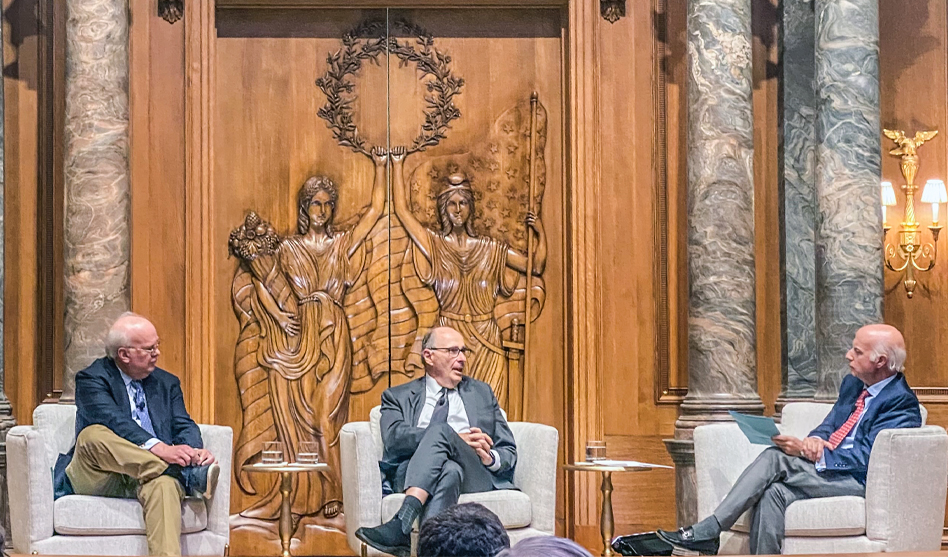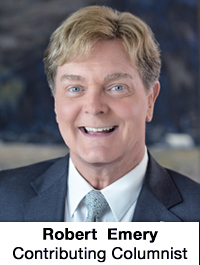What do the master political strategists have to say about the 2024 elections?

All photos courtesy of Robert Emery
 David Axelrod is best known for being the chief strategist for Barack Obama’s presidential campaigns. After Obama’s election, Axelrod was appointed as senior advisor to the president. He left that position in early 2011 to serve as the senior strategist for Obama’s successful re-election campaign in 2012.
David Axelrod is best known for being the chief strategist for Barack Obama’s presidential campaigns. After Obama’s election, Axelrod was appointed as senior advisor to the president. He left that position in early 2011 to serve as the senior strategist for Obama’s successful re-election campaign in 2012.
In 2014, Axelrod was appointed senior strategic adviser to the British Labour Party to assist party leader Ed Miliband in the run-up to the 2015 general election, and he joined CNN as senior political commentator in 2015.
He is a genius progressive strategist.
Karl Rove is a Republican political consultant, policy advisor and lobbyist. He was senior advisor and deputy chief of staff during the George W. Bush administration. He was one of the architects of the Iraq War.
Rove is credited with George W. Bush’s 1994 and 1998 Texas gubernatorial victories, as well as Bush’s successful 2000 and 2004 presidential campaigns. In his 2004 victory speech, Bush referred to Rove as “the architect.”
Rove has also been credited for the successful campaigns of Bill Clements (1986 Texas gubernatorial election), Sen. John Cornyn (2002 U.S. Senate election), Gov. Rick Perry (1990 Texas Agriculture Commission election) and Phil Gramm (1982 U.S. House and 1984 U.S. Senate elections). Since leaving the White House, Rove has worked as a political analyst and contributor for Fox News.
He is a master conservative strategist.
On Wednesday night, Oct. 16, in the Debate Chamber at Old Parkland, the Trammell and Margaret Crow Foundation hosted a debate between these two powerhouses of political strategy. One might expect the stark contrast between the two men and their vision of our world to be on vivid display.
But there is something surprising that makes them similar to each other: They are both calculating mathematicians who view the world from a “30,000-foot view” or a “big picture” perspective.
These men are not distracted by details such as a candidate’s “policy” or “character.” They are concerned with the voters’ response to their candidate’s “policy” and “character.”
They remain less focused on what their candidate says or does and more focused on the numbers found in polls and surveys.
Axelrod and Rove are friends. They spend time together that is the only way they could have inside jokes between them and private stories to share with their audience.
Their admiration and respect for each other were evident in their comfort and ease with each other. The event was not as much a debate as it was a shared conversation, with lighthearted laughter and enlightening observations.
Rove told us he did not want George W. Bush to choose Dick Cheney as his vice presidential running mate. After he had laid out the many reasons why Bush should not choose Cheney, the then-governor of Texas told Rove: “Forget about it! I’m doing it!”
Rove also believes that political advertisements are a waste of money. He declared, “Ads don’t matter as much as hearing the candidate explain their positions.”
“Ads only work,” he explained, “if the candidate can repeat and reinforce the message heard in the ad. Harris can do that. Trump cannot.”
He went on to say, “The Trump team has created a rational campaign [but] with an irrational candidate.”
Axelrod believes that Vice President Kamala Harris had a remarkable beginning to her candidacy, and now she needs to create a “Second Act” that will show the American people new things about her. “She was a great ‘first date’, ‘second date’ and ‘third date,’” he said. “But now the American people are thinking about ‘marriage,’ and they need to know more about her.”
Axelrod said he wishes that candidate Harris had had more time to go through the “primary” process, to show the voters more of herself. He is not confident the 90-day time frame will work in her favor.
The two strategists agree that Republicans will likely take the Senate and Democrats will likely take the House — both by narrow margins. They assured their audience steps are being taken to guarantee the security of our election and the safety of our Capitol on Jan. 6, 2025.
When asked, directly, neither would commit to whom will win The White House. They weren’t being coy; they were honestly unable to predict a winner.
“It’s that close!” Axelrod explains.
What it comes down to is you. The outcome depends on you.
You must vote. Your vote is your voice.
Vote for “country over party.” Choose democracy over autocracy.
Vote for the future you want to see.

Thank you, DallasVOICE. Texas can elect Colin Allred, IF we will vote. We MUST vote! Make a plan.
Thank you Robert, for this summary of a meeting between two great minds. It is my hope to have a record-breaking turnout at the polls. We must not be idle in our responsibilities as citizens. We are fortunate to have this right, and we have the power if only we all would utilize it.